Macbeth: An Analysis of Ambition and Tragedy in Shakespeare's Play
VerifiedAdded on 2020/02/24
|5
|1155
|348
Essay
AI Summary
This essay examines Macbeth as a tragic hero, focusing on the character's ambition, political motivations, and eventual downfall. The analysis highlights Macbeth's initial high status, courage, and the influence of the witches' prophecy, which fueled his desire for power. It details how Macbeth's ambition, coupled with Lady Macbeth's influence, led him to commit regicide and descend into tyranny, resulting in a series of murders to secure his throne. The essay explores Macbeth's moral decline, driven by fear and a thirst for power, ultimately leading to his defeat and death. The conclusion emphasizes the dangers of unchecked ambition and the destructive nature of the pursuit of power, drawing parallels between Macbeth's tragic fate and the broader consequences of political ambition.
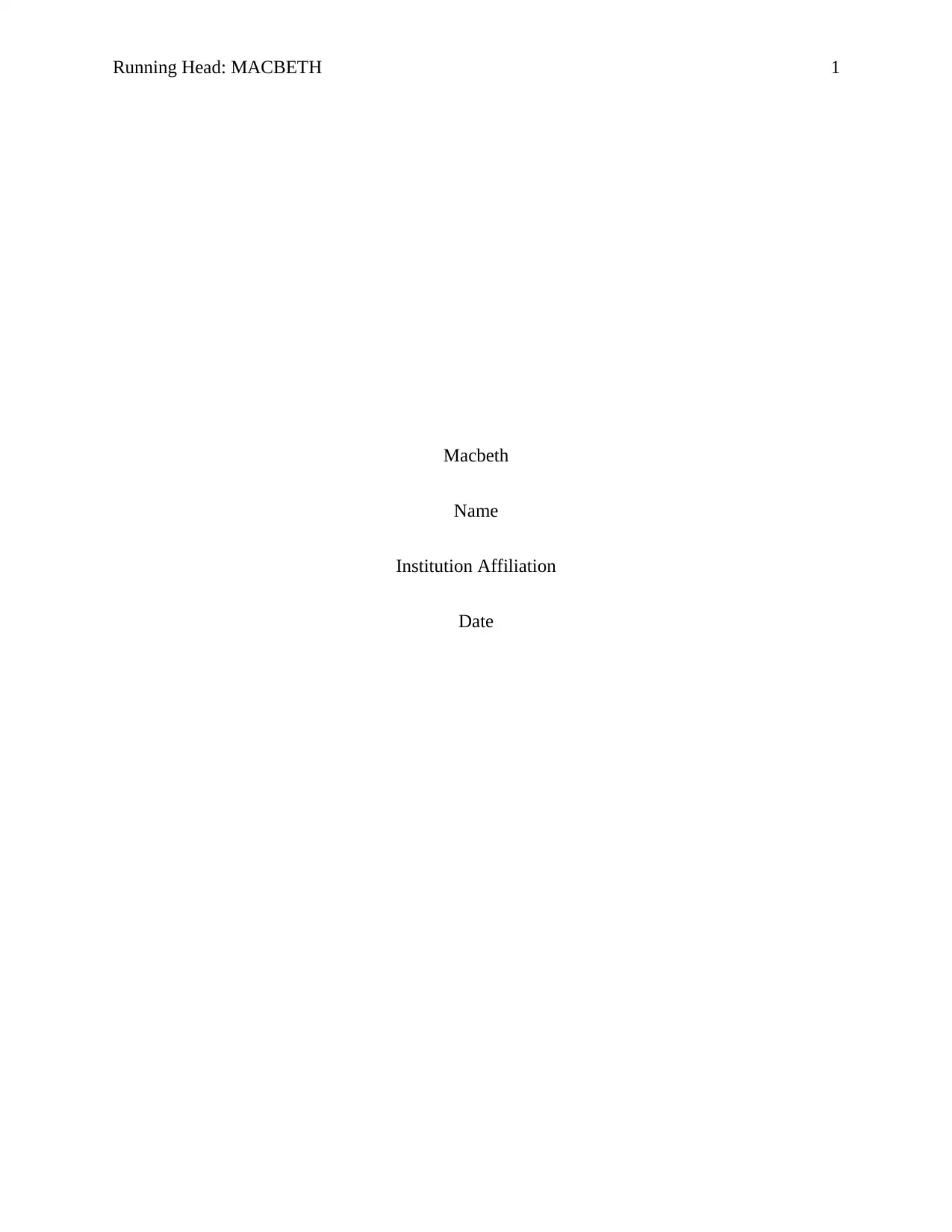
Running Head: MACBETH 1
Macbeth
Name
Institution Affiliation
Date
Macbeth
Name
Institution Affiliation
Date
Paraphrase This Document
Need a fresh take? Get an instant paraphrase of this document with our AI Paraphraser
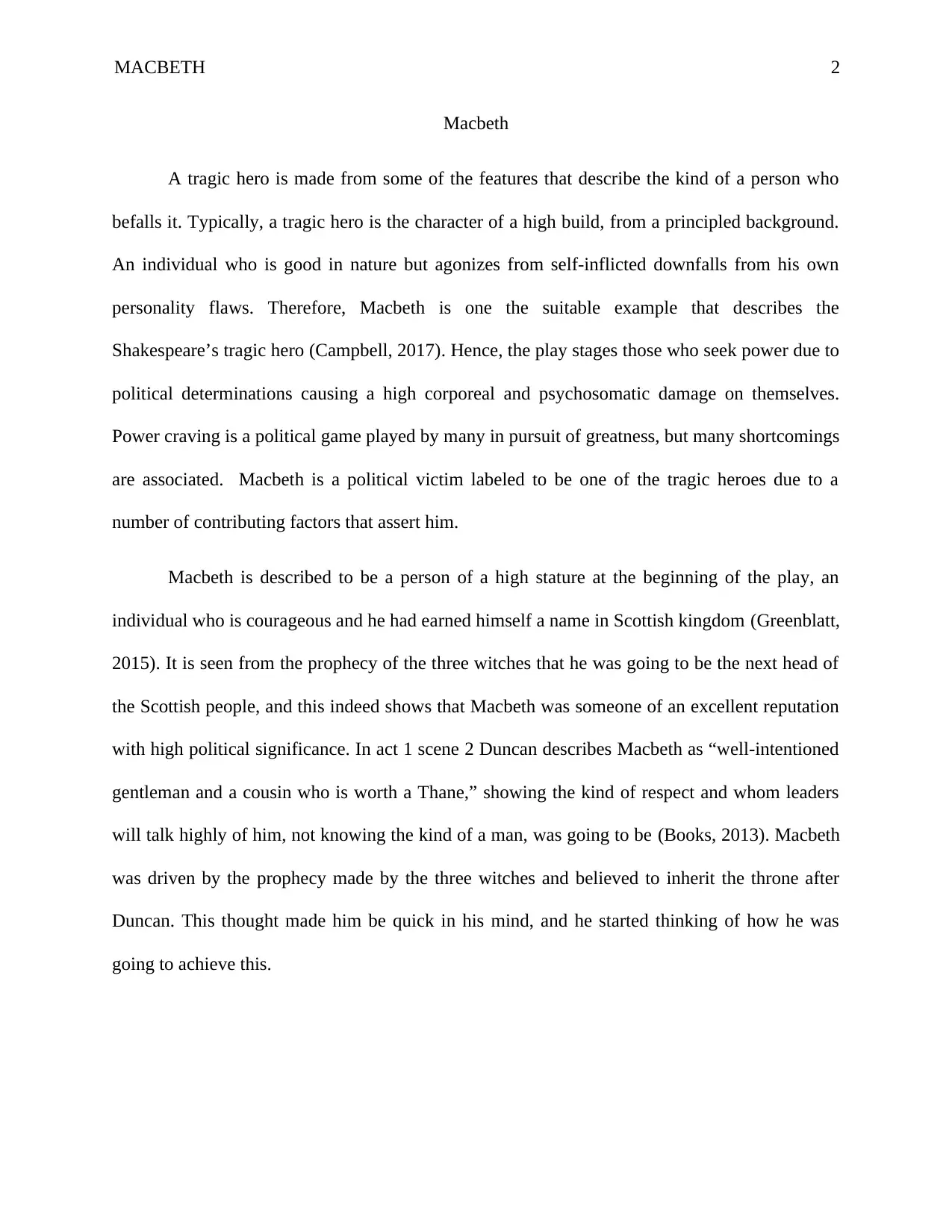
MACBETH 2
Macbeth
A tragic hero is made from some of the features that describe the kind of a person who
befalls it. Typically, a tragic hero is the character of a high build, from a principled background.
An individual who is good in nature but agonizes from self-inflicted downfalls from his own
personality flaws. Therefore, Macbeth is one the suitable example that describes the
Shakespeare’s tragic hero (Campbell, 2017). Hence, the play stages those who seek power due to
political determinations causing a high corporeal and psychosomatic damage on themselves.
Power craving is a political game played by many in pursuit of greatness, but many shortcomings
are associated. Macbeth is a political victim labeled to be one of the tragic heroes due to a
number of contributing factors that assert him.
Macbeth is described to be a person of a high stature at the beginning of the play, an
individual who is courageous and he had earned himself a name in Scottish kingdom (Greenblatt,
2015). It is seen from the prophecy of the three witches that he was going to be the next head of
the Scottish people, and this indeed shows that Macbeth was someone of an excellent reputation
with high political significance. In act 1 scene 2 Duncan describes Macbeth as “well-intentioned
gentleman and a cousin who is worth a Thane,” showing the kind of respect and whom leaders
will talk highly of him, not knowing the kind of a man, was going to be (Books, 2013). Macbeth
was driven by the prophecy made by the three witches and believed to inherit the throne after
Duncan. This thought made him be quick in his mind, and he started thinking of how he was
going to achieve this.
Macbeth
A tragic hero is made from some of the features that describe the kind of a person who
befalls it. Typically, a tragic hero is the character of a high build, from a principled background.
An individual who is good in nature but agonizes from self-inflicted downfalls from his own
personality flaws. Therefore, Macbeth is one the suitable example that describes the
Shakespeare’s tragic hero (Campbell, 2017). Hence, the play stages those who seek power due to
political determinations causing a high corporeal and psychosomatic damage on themselves.
Power craving is a political game played by many in pursuit of greatness, but many shortcomings
are associated. Macbeth is a political victim labeled to be one of the tragic heroes due to a
number of contributing factors that assert him.
Macbeth is described to be a person of a high stature at the beginning of the play, an
individual who is courageous and he had earned himself a name in Scottish kingdom (Greenblatt,
2015). It is seen from the prophecy of the three witches that he was going to be the next head of
the Scottish people, and this indeed shows that Macbeth was someone of an excellent reputation
with high political significance. In act 1 scene 2 Duncan describes Macbeth as “well-intentioned
gentleman and a cousin who is worth a Thane,” showing the kind of respect and whom leaders
will talk highly of him, not knowing the kind of a man, was going to be (Books, 2013). Macbeth
was driven by the prophecy made by the three witches and believed to inherit the throne after
Duncan. This thought made him be quick in his mind, and he started thinking of how he was
going to achieve this.
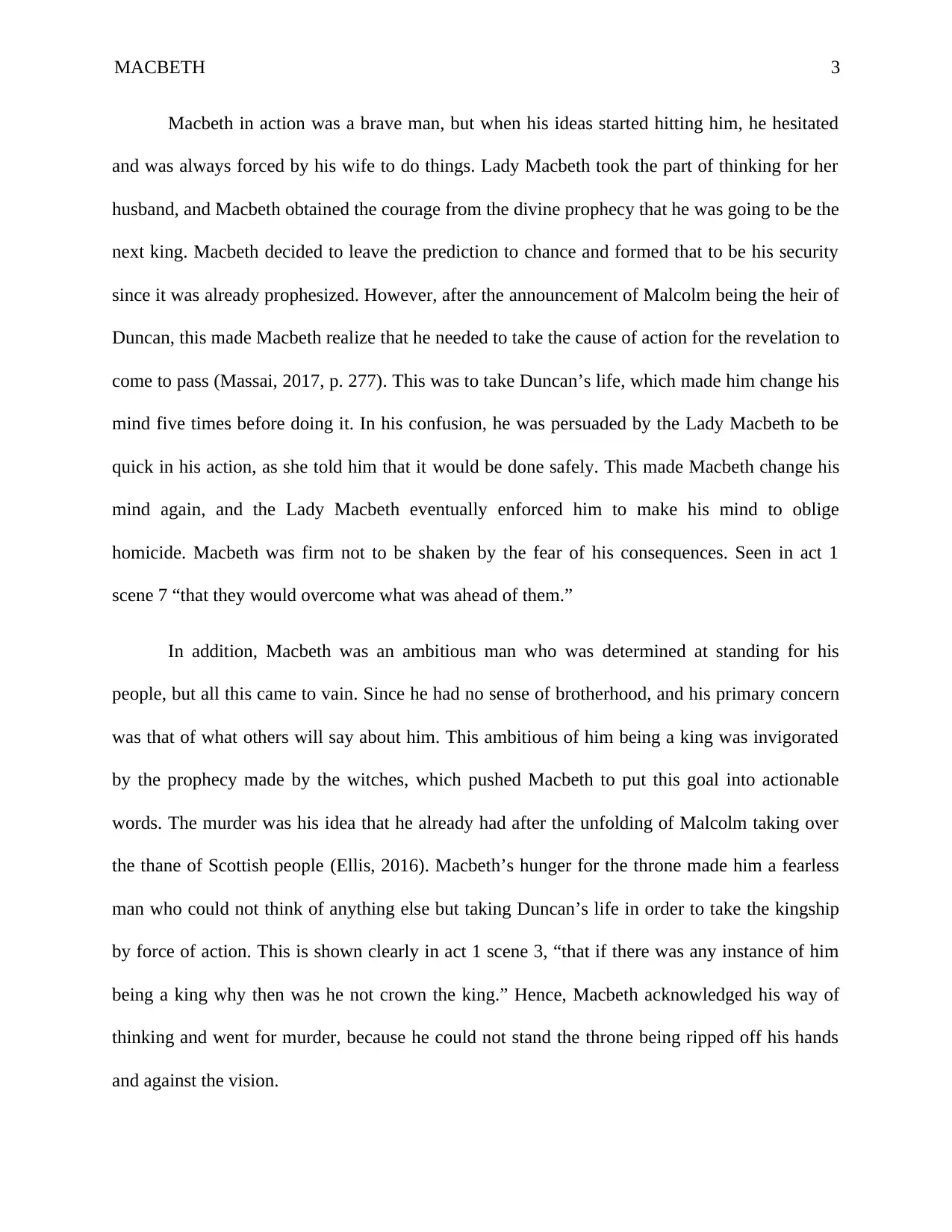
MACBETH 3
Macbeth in action was a brave man, but when his ideas started hitting him, he hesitated
and was always forced by his wife to do things. Lady Macbeth took the part of thinking for her
husband, and Macbeth obtained the courage from the divine prophecy that he was going to be the
next king. Macbeth decided to leave the prediction to chance and formed that to be his security
since it was already prophesized. However, after the announcement of Malcolm being the heir of
Duncan, this made Macbeth realize that he needed to take the cause of action for the revelation to
come to pass (Massai, 2017, p. 277). This was to take Duncan’s life, which made him change his
mind five times before doing it. In his confusion, he was persuaded by the Lady Macbeth to be
quick in his action, as she told him that it would be done safely. This made Macbeth change his
mind again, and the Lady Macbeth eventually enforced him to make his mind to oblige
homicide. Macbeth was firm not to be shaken by the fear of his consequences. Seen in act 1
scene 7 “that they would overcome what was ahead of them.”
In addition, Macbeth was an ambitious man who was determined at standing for his
people, but all this came to vain. Since he had no sense of brotherhood, and his primary concern
was that of what others will say about him. This ambitious of him being a king was invigorated
by the prophecy made by the witches, which pushed Macbeth to put this goal into actionable
words. The murder was his idea that he already had after the unfolding of Malcolm taking over
the thane of Scottish people (Ellis, 2016). Macbeth’s hunger for the throne made him a fearless
man who could not think of anything else but taking Duncan’s life in order to take the kingship
by force of action. This is shown clearly in act 1 scene 3, “that if there was any instance of him
being a king why then was he not crown the king.” Hence, Macbeth acknowledged his way of
thinking and went for murder, because he could not stand the throne being ripped off his hands
and against the vision.
Macbeth in action was a brave man, but when his ideas started hitting him, he hesitated
and was always forced by his wife to do things. Lady Macbeth took the part of thinking for her
husband, and Macbeth obtained the courage from the divine prophecy that he was going to be the
next king. Macbeth decided to leave the prediction to chance and formed that to be his security
since it was already prophesized. However, after the announcement of Malcolm being the heir of
Duncan, this made Macbeth realize that he needed to take the cause of action for the revelation to
come to pass (Massai, 2017, p. 277). This was to take Duncan’s life, which made him change his
mind five times before doing it. In his confusion, he was persuaded by the Lady Macbeth to be
quick in his action, as she told him that it would be done safely. This made Macbeth change his
mind again, and the Lady Macbeth eventually enforced him to make his mind to oblige
homicide. Macbeth was firm not to be shaken by the fear of his consequences. Seen in act 1
scene 7 “that they would overcome what was ahead of them.”
In addition, Macbeth was an ambitious man who was determined at standing for his
people, but all this came to vain. Since he had no sense of brotherhood, and his primary concern
was that of what others will say about him. This ambitious of him being a king was invigorated
by the prophecy made by the witches, which pushed Macbeth to put this goal into actionable
words. The murder was his idea that he already had after the unfolding of Malcolm taking over
the thane of Scottish people (Ellis, 2016). Macbeth’s hunger for the throne made him a fearless
man who could not think of anything else but taking Duncan’s life in order to take the kingship
by force of action. This is shown clearly in act 1 scene 3, “that if there was any instance of him
being a king why then was he not crown the king.” Hence, Macbeth acknowledged his way of
thinking and went for murder, because he could not stand the throne being ripped off his hands
and against the vision.
⊘ This is a preview!⊘
Do you want full access?
Subscribe today to unlock all pages.

Trusted by 1+ million students worldwide
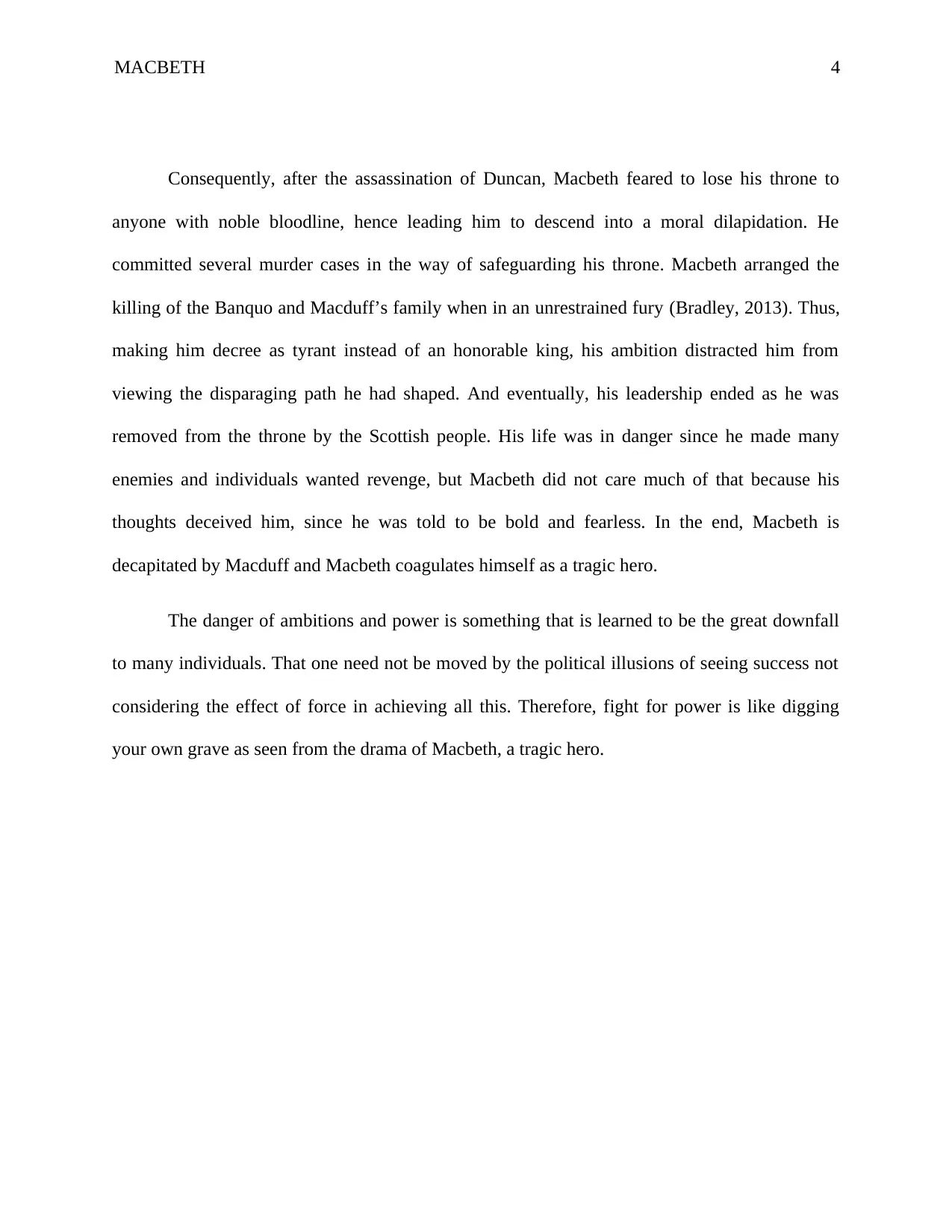
MACBETH 4
Consequently, after the assassination of Duncan, Macbeth feared to lose his throne to
anyone with noble bloodline, hence leading him to descend into a moral dilapidation. He
committed several murder cases in the way of safeguarding his throne. Macbeth arranged the
killing of the Banquo and Macduff’s family when in an unrestrained fury (Bradley, 2013). Thus,
making him decree as tyrant instead of an honorable king, his ambition distracted him from
viewing the disparaging path he had shaped. And eventually, his leadership ended as he was
removed from the throne by the Scottish people. His life was in danger since he made many
enemies and individuals wanted revenge, but Macbeth did not care much of that because his
thoughts deceived him, since he was told to be bold and fearless. In the end, Macbeth is
decapitated by Macduff and Macbeth coagulates himself as a tragic hero.
The danger of ambitions and power is something that is learned to be the great downfall
to many individuals. That one need not be moved by the political illusions of seeing success not
considering the effect of force in achieving all this. Therefore, fight for power is like digging
your own grave as seen from the drama of Macbeth, a tragic hero.
Consequently, after the assassination of Duncan, Macbeth feared to lose his throne to
anyone with noble bloodline, hence leading him to descend into a moral dilapidation. He
committed several murder cases in the way of safeguarding his throne. Macbeth arranged the
killing of the Banquo and Macduff’s family when in an unrestrained fury (Bradley, 2013). Thus,
making him decree as tyrant instead of an honorable king, his ambition distracted him from
viewing the disparaging path he had shaped. And eventually, his leadership ended as he was
removed from the throne by the Scottish people. His life was in danger since he made many
enemies and individuals wanted revenge, but Macbeth did not care much of that because his
thoughts deceived him, since he was told to be bold and fearless. In the end, Macbeth is
decapitated by Macduff and Macbeth coagulates himself as a tragic hero.
The danger of ambitions and power is something that is learned to be the great downfall
to many individuals. That one need not be moved by the political illusions of seeing success not
considering the effect of force in achieving all this. Therefore, fight for power is like digging
your own grave as seen from the drama of Macbeth, a tragic hero.
Paraphrase This Document
Need a fresh take? Get an instant paraphrase of this document with our AI Paraphraser
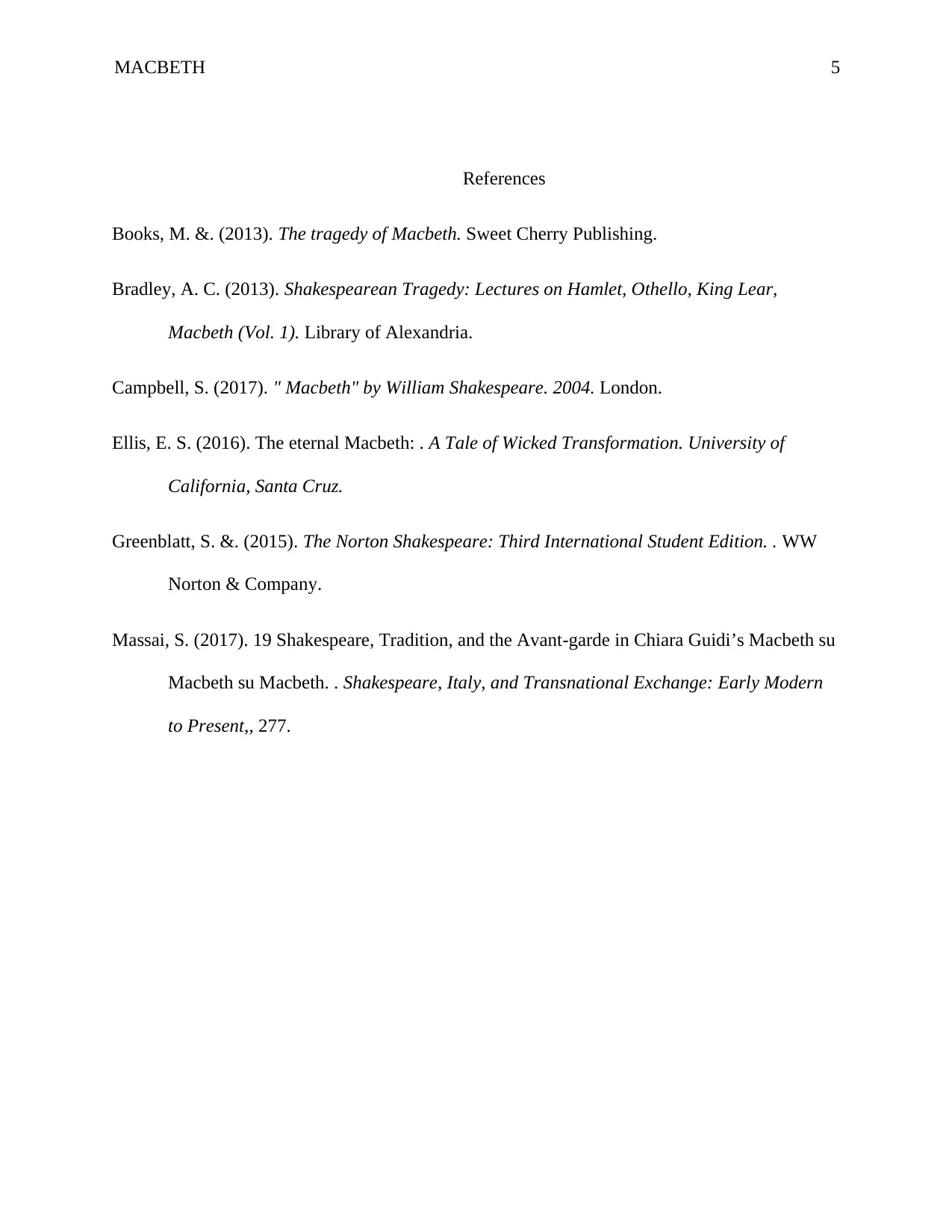
MACBETH 5
References
Books, M. &. (2013). The tragedy of Macbeth. Sweet Cherry Publishing.
Bradley, A. C. (2013). Shakespearean Tragedy: Lectures on Hamlet, Othello, King Lear,
Macbeth (Vol. 1). Library of Alexandria.
Campbell, S. (2017). " Macbeth" by William Shakespeare. 2004. London.
Ellis, E. S. (2016). The eternal Macbeth: . A Tale of Wicked Transformation. University of
California, Santa Cruz.
Greenblatt, S. &. (2015). The Norton Shakespeare: Third International Student Edition. . WW
Norton & Company.
Massai, S. (2017). 19 Shakespeare, Tradition, and the Avant-garde in Chiara Guidi’s Macbeth su
Macbeth su Macbeth. . Shakespeare, Italy, and Transnational Exchange: Early Modern
to Present,, 277.
References
Books, M. &. (2013). The tragedy of Macbeth. Sweet Cherry Publishing.
Bradley, A. C. (2013). Shakespearean Tragedy: Lectures on Hamlet, Othello, King Lear,
Macbeth (Vol. 1). Library of Alexandria.
Campbell, S. (2017). " Macbeth" by William Shakespeare. 2004. London.
Ellis, E. S. (2016). The eternal Macbeth: . A Tale of Wicked Transformation. University of
California, Santa Cruz.
Greenblatt, S. &. (2015). The Norton Shakespeare: Third International Student Edition. . WW
Norton & Company.
Massai, S. (2017). 19 Shakespeare, Tradition, and the Avant-garde in Chiara Guidi’s Macbeth su
Macbeth su Macbeth. . Shakespeare, Italy, and Transnational Exchange: Early Modern
to Present,, 277.
1 out of 5
Related Documents
Your All-in-One AI-Powered Toolkit for Academic Success.
+13062052269
info@desklib.com
Available 24*7 on WhatsApp / Email
![[object Object]](/_next/static/media/star-bottom.7253800d.svg)
Unlock your academic potential
Copyright © 2020–2026 A2Z Services. All Rights Reserved. Developed and managed by ZUCOL.





